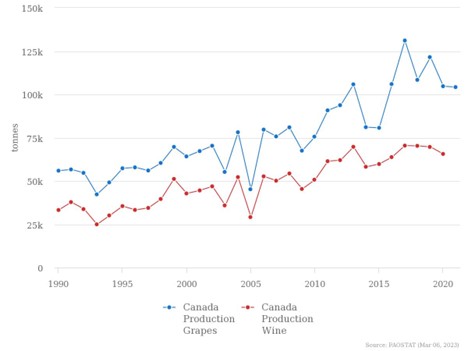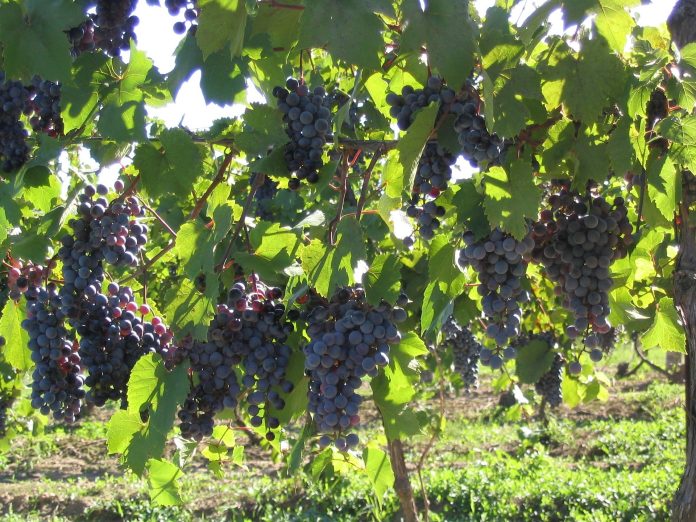CBC, Canada’s public broadcaster, published a confused article that claims Canadian vineyards are suffering due to climate change, and that genetic engineering is going to be needed in order to help certain grape varietals survive in Canada. While it may be true that certain popular types of grapes struggle in the cold and damp of Ontario, where many Canadian vineyards are, the past hundred years of climate change has had no measurable effect on Canadian grape production.
The article, “With climate change threatening Canadian vineyards, is genetically engineered wine on the horizon?” admits right away that many people believe that global warming will aid the Canadian wine industry by making winters milder in the southern parts of the country. The CBC’s “science communicator,” Darius Mahdavi, who wrote the piece, asserts that Canadian winters “are milder on average, but still experience drops to extreme cold” and that they “could actually be worse for vineyards.”
Researchers interviewed by Mahdavi say that sudden cold snaps during a winter that started off mild can catch grape vines off guard, and damage them more readily than normal hard winters. At the same time, Mahdavi admits that Canada’s southernmost wine producing regions of have already benefited from the naturally milder zones around the Great Lakes.
Luckily for grape growers in Canada, there is no data that shows arctic outbreaks are more frequent or common, and the U.N. Intergovernmental Panel on Climate Change reports that instances of extreme cold should continue to decline as the earth modestly warms. This means there will be fewer crop-endangering cold snaps in general, not more, alongside the milder start to winter.
The article also discusses how Canadian growers like to stick with European varieties that are not normally very cold tolerant, and suffer from disease in Ontario’s environment, despite the fact that other grapes, like those grown in Germany, or regionally developed hybrids, can be hardier and produce more regularly. Wine made from a hybrid grape cannot be honestly labelled as a Merlot, Cabernet Sauvignon, or other specific grape varietals.
In this case, it seems Canadian wine producers’ main problem is not climate change, but rather some vintners insistence on attempting to produce wine from varietals of grapes not well suited to cold regions, where sudden freezes and heavy snow are common.
The article goes on to describe how gene editing could allow scientists to remove genes from European grape varieties that make them prone to disease, without needing to hybridize. If Canadian vintners stubbornly cling to the desire to producing certain types of wine not normally grown colder climes, rather than growing grape varietals and producing wines more suited to the climate, it might make sense to use gene editing make something like a Chardonnay grape more capable of surviving normally unfriendly regions of the world. But this has nothing to do with climate change. As Climate Realism has discussed previously, here, here, and here, for example, grape production varies regionally from year to year. Some years will have unfavorable weather conditions for grapes in one part of the world, where others will see bumper crops.
Canada is neither a major producer of grapes nor wine, especially compared to the large wine producing countries and regions around the world. Despite this, data from the United Nations Food and Agriculture Organization show that amid the normal year to year ups and downs of crop production during the recent period of modest warming, since the 1990s both grape and wine production have increased in Canada: grape production has grown by more than 86 percent, and wine production increased by more than 97 percent. (See figure below)

There is no evidence climate change has or will hamper Canadian wine production. Indeed, slightly warmer weather should make the region more suitable to growing the types warm weather varietals some Canadian vintners seem insistent on producing. The CBC could have produced an interesting story about the difficulties of producing home grown wine in Canada and how genetic engineering may be used to make grapes heartier and more resistant to cold and disease. Instead, the public broadcaster attempted to link one more non-existent threat to the climate change.
As is true with so many stories hyping the “climate crisis,” there is no actual evidence to back up the CBC’s claims that weather is making Canadian wine production harder. As such, CBC did a disservice to Canadian growers and the wine consuming public. The good news is the future of wine production in Canada appears to be safe, and even growing.















